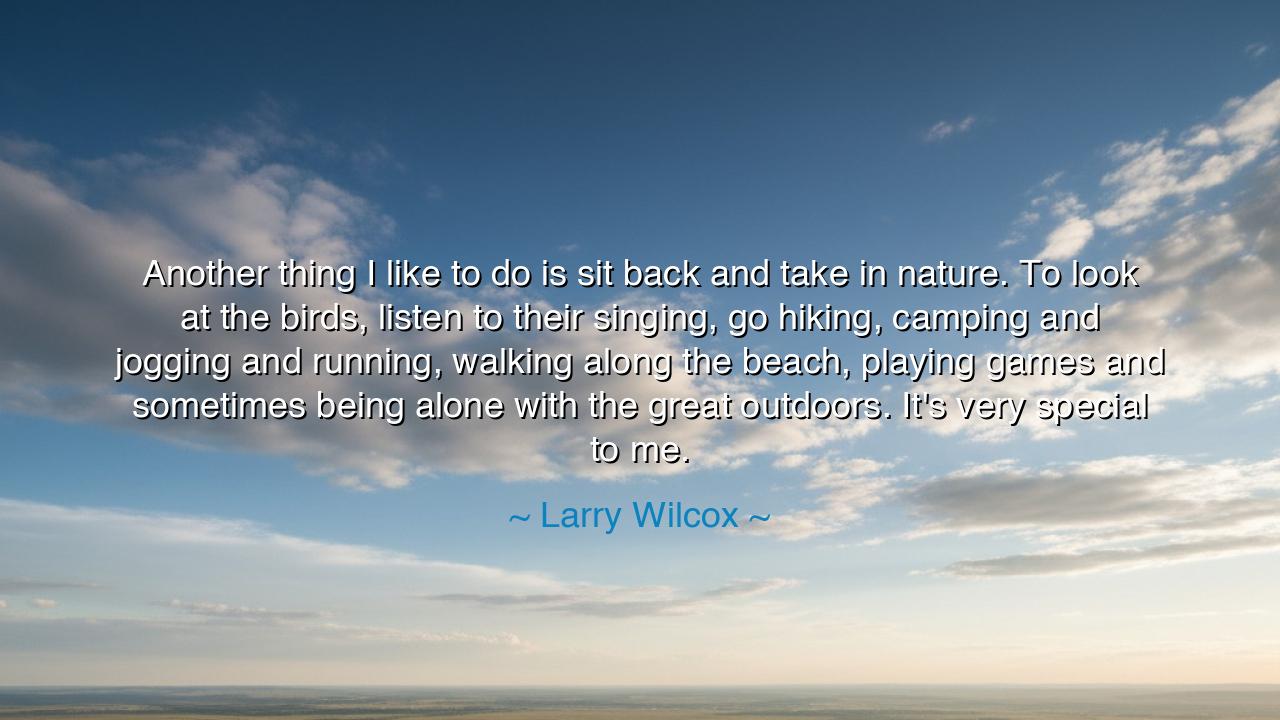
Another thing I like to do is sit back and take in nature. To
Another thing I like to do is sit back and take in nature. To look at the birds, listen to their singing, go hiking, camping and jogging and running, walking along the beach, playing games and sometimes being alone with the great outdoors. It's very special to me.






"Another thing I like to do is sit back and take in nature. To look at the birds, listen to their singing, go hiking, camping and jogging and running, walking along the beach, playing games and sometimes being alone with the great outdoors. It's very special to me." These heartfelt words by Larry Wilcox speak to a universal truth about the nourishment that nature provides to the soul. In an age where life moves quickly and distractions abound, Wilcox’s appreciation for the simple, natural rhythms of the earth invites us to pause, breathe, and reconnect with the world around us. To observe the birds, to listen to their songs, to hike through the mountains or run along the beach—these are the moments when we rediscover ourselves, when we become attuned to the deeper, timeless pulse of nature.
In the ancient world, the connection between humans and nature was deeply sacred. The Greeks, for instance, saw nature as the reflection of the divine. The gods and goddesses often resided in nature—Artemis in the forests, Apollo in the sunlit skies. For the ancients, being in nature was a way of connecting to the cosmic order, a reminder of the larger forces at work in the world. Heraclitus, the philosopher, famously said that "nature loves to hide", suggesting that the natural world contains deep wisdom, if only we take the time to observe and understand it. Wilcox’s words reflect this ancient understanding that to spend time in nature is to be in the presence of something much greater than ourselves—a force that heals, inspires, and teaches.
The Romans, too, valued their connection with nature. The concept of "otium", which referred to a time of rest, leisure, and reflection, was often spent in natural surroundings. Cicero, in his letters, often described walking in his garden or taking solitary reflection in nature as a way of rejuvenating the mind and reconnecting with deeper thoughts. For Cicero, these moments were not mere leisure but opportunities to cultivate wisdom and clarity. Just as Wilcox finds peace in nature, so too did the ancients seek the quiet stillness of the outdoors to revive their spirits and clarify their thoughts.
Consider the story of Henry David Thoreau, whose profound connection with nature became the foundation of his philosophy of life. In his famous work Walden, Thoreau describes his solitude and time spent in the woods by Walden Pond as a spiritual awakening. Thoreau’s time in nature was not an escape but an opportunity to rediscover the simplicity and truth that modern life often obscures. Much like Wilcox, Thoreau found that nature, in its quiet majesty, could offer both solace and clarity, enabling him to connect more deeply with his inner world. It is in solitude with nature that Thoreau learned the invaluable lesson that time spent outside is not wasted but invested in our mental well-being and spiritual growth.
Wilcox’s reverence for nature as a sanctuary for the soul also draws attention to the modern need for balance. In an era marked by technology, work, and constant noise, many have forgotten the healing power of nature. Just as the ancients took time to retreat to the natural world for rest and reflection, we too must create spaces for ourselves where we can step away from the bustle of daily life. Birdwatching, jogging, or simply walking in a park are modern ways to experience the peace that nature offers. It is not always about escapism but about reconnection—reconnecting to the earth, to our own bodies, and to the deeper truths that lie within us.
The lesson from Wilcox’s quote is one of mindful engagement with the world around us. Too often, we are consumed by our to-do lists, obligations, and distractions, forgetting that true peace and inspiration can be found when we allow ourselves to simply be. By stepping outside, whether in a forest, on a beach, or even in a quiet garden, we reconnect with something greater than ourselves. In those moments, we can hear the wisdom of nature—a wisdom that does not need words but speaks in the gentle rustling of leaves or the rhythmic crash of waves. These moments of solitude in nature help us realign with our inner selves and purpose.
In our own lives, let us follow Wilcox’s example and take time to embrace nature. Whether we hike, jog, or simply sit by a body of water, we must make space for these moments of stillness and reflection. Nature is not just an escape, but a teacher, offering us lessons in patience, renewal, and clarity. Let us take time to observe the world around us, to listen to its rhythm, and to find solace in its beauty. Through these acts, we honor the ancient wisdom that nature—in all its forms—has the power to heal, to inspire, and to bring us closer to the truth of who we are.






AAdministratorAdministrator
Welcome, honored guests. Please leave a comment, we will respond soon